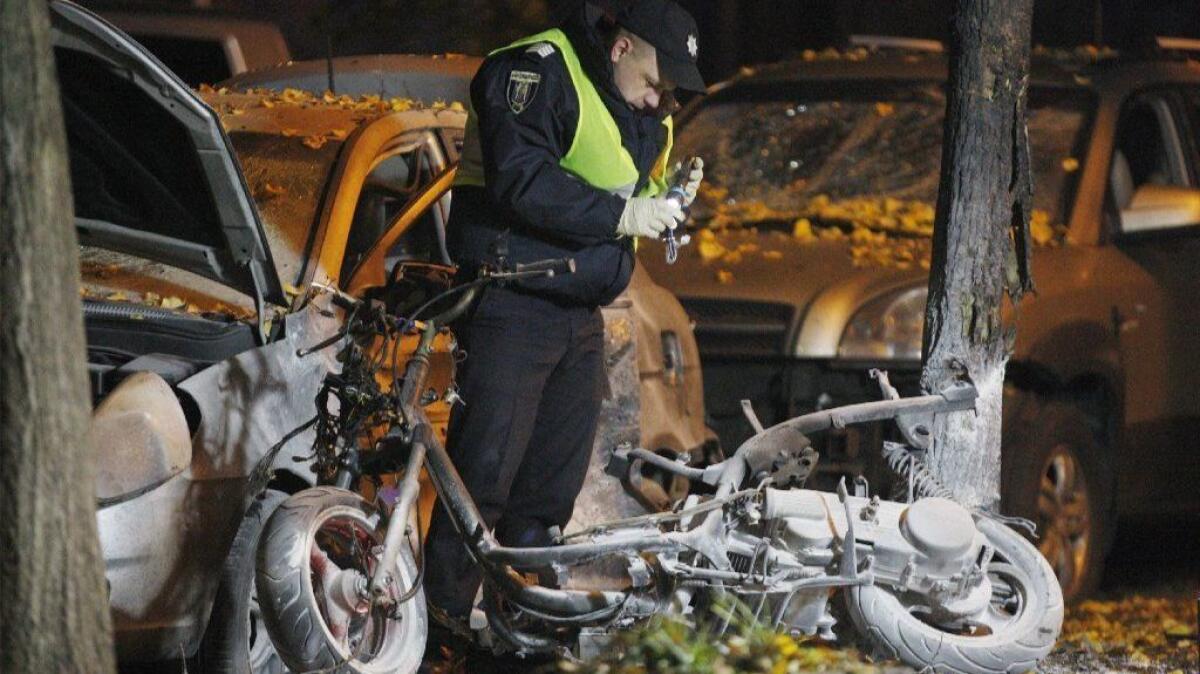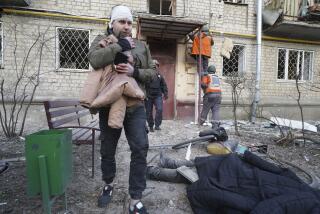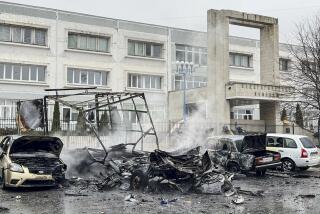Bombing that wounded Ukrainian lawmaker and killed 2 stirs fears of assassination attempts

When a bomb exploded outside a television station in Kiev, the Ukraine capital, lawmaker Ihor Mosiychuk of the nationalist opposition Radical Party was exiting after an interview.
Mosiychuk was wounded, and his bodyguard and a pedestrian were killed, police said Thursday. Four others were wounded.
Almost immediately, Mosiychuk blamed Russia for the Wednesday night explosion, which authorities said involved a bomb attached to a parked motorcycle.
“I believe that the initiators are in Moscow, the executors are in Kiev,” he wrote on social media.
Ukraine President Petro Poroshenko called the bombing a “bloody and cruel crime.”
Many authorities in Ukraine consider the bombing the latest in a string of assassination attempts that have threatened to further destabilize the former Soviet republic struggling against Kremlin-backed separatist militias in its eastern regions.
Ukraine has been locked in a brutal military conflict with Moscow-backed separatists since 2014. The conflict has killed 10,000 people, mostly civilians, and displaced another 1.2 million.
The Kremlin, however, denied any involvement in the bombing that injured Mosiychuk.
“These are new signs of this anti-Russian campaign, which has unfortunately swept across Ukraine and Kiev,” Russian President Vladimir Putin’s spokesman, Dmitry Peskov, said in a conference call with reporters.
Investigators said they had not ruled out the possibility of Russian involvement in the bombing but were also looking into the possibility that the attack was connected to a domestic political dispute or personal feud.
The attack comes after several attacks in Ukraine, many of them in Kiev, which have rocked the war-torn nation and raised questions about the security situation outside the conflict zone. Most of the attacks remain unsolved. Officials say all of them appeared to be well planned.
In June 2016, two separate incidents involving explosive devices on the same day in different Ukrainian cities killed a Ukrainian military intelligence officer and a member of the country’s security service.
The next month, a car bomb in Kiev killed Pavel Sheremet, a prominent Ukrainian investigative journalist.
In March, a former Russian lawmaker critical of Putin and living in self-imposed exile in Ukraine was shot dead outside a luxurious Kiev hotel. At that time, Poroshenko called the slaying of Denis Voronenkov an act of Russian state terrorism.
Ukrainian authorities have been quick to link Russian security services to the seemingly elaborately planned attacks. So far, there has been only circumstantial evidence.
Ukraine’s economy has been badly battered by political upheaval in the last four years since a popular street protest that began in 2013 led to the ouster the next year of a Kremlin-friendly government. Then-President Viktor Yanukovich fled to Russia.
High unemployment, inflation and a stagnant economy help create the possibility that the disgruntled could be lured with promises of financial reward to assemble or detonate explosive devices, said Alex Kokcharov, a Russia and Ukraine analyst with IHS Markit, a risk analysis agency in London.
“It’s conceivable to speculate that similar things are happening today in the context that there are a lot of people now in Ukraine with recent conflict experience, access to weapons and explosive devices, and a poor economic situation,” he said.
Twitter: @sabraayres
Ayres is a special correspondent.
More to Read
Start your day right
Sign up for Essential California for news, features and recommendations from the L.A. Times and beyond in your inbox six days a week.
You may occasionally receive promotional content from the Los Angeles Times.







